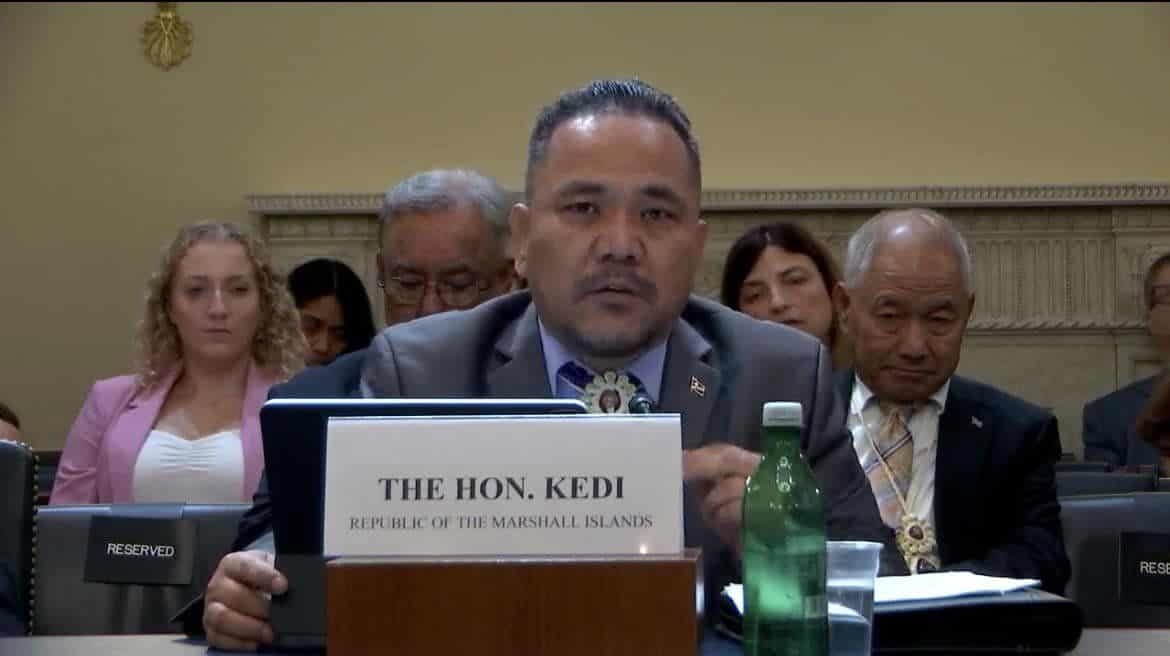The Marshall Islands on Tuesday called on Washington to pay “full” compensation for the health, environmental and cultural damage caused by 67 nuclear tests carried out by the American government, refusing to accept the Joe Biden administration’s newest version of a strategic agreement that has steered bilateral ties for decades.
It was the people of the Pacific nation who played a major role in helping Allied forces capture Japanese invaders in the region during World War II, said Kenneth Kedi, speaker of the country’s parliament, in testimony before an Indo-Pacific task force of the House Natural Resources Committee.
Narrating what he called a brief history of the sacrifices made by the Marshall Islands for the U.S., Kedi told the panel that, after the wartime fighting ended, it was the Marshallese who “without a choice” found themselves in the middle of the Cold War.
The nuclear tests in question took place across the archipelago between 1946 and 1958, and the U.S. made a “massive display of power” by detonating the bombs on the islands, he said.
Kedi testified that the tests “unfortunately” led to high rates of cancer and extensive environmental damage, explaining that both his parents died prematurely from cancer.
“And this is not a unique story for me or for the Marshall Islands. Most families have gone through the same.”
The Marshallese politician quoted a UN report in urging the U.S. to go on record and apologise to his country, saying: “We are yet to get an apology.”
Combined, the tests were “thousands of times as powerful as the bomb dropped on Hiroshima”, according to a 2015 report published by the Pulitzer Centre. Cancer is a leading cause of death on the Marshall Islands.
Kedi cited the findings of a nuclear claims tribunal set up between the U.S. and the Marshall Islands “to adjudicate and pay substantiated and warranted claims”.
He said the tribunal ran out of funds after paying a small fraction of the damages it awarded, with the total amount of unpaid awards standing at US$3 billion in current dollars.
Marshallese people had sacrificed significantly by giving their traditional land to the U.S. for military use, Kedi testified.
In the event of “any war coming from, who knows where,” the Marshall Islands would be “the first shield of defence before anything”, he added.
The American military installation on the country’s largest island, Kwajalein Atoll, has been described by the U.S. Department of Defence as “an important asset that would be costly and difficult to replicate”.
After administering Micronesia, the Marshall Islands and Palau under a UN trusteeship after World War II, the U.S. signed international treaties with each as sovereign Pacific nations in 1986 and 1994 under the Compact of Free Association or COFA.
The pacts granted the U.S. military access to each nation’s land, air and sea in exchange for financial assistance and permission to legally live, work and go to school in the U.S..
For decades following World War II, Washington did not regard the Pacific island region as a national security priority. But as China’s economic and geopolitical influence in the Indo-Pacific grew, the U.S. took more notice of the region.
“We see the presence and influence of China on a daily basis,” Joseph Yun, President Joe Biden’s special envoy for COFA negotiations, told the panel on Tuesday.
Yun accused China of employing “coercive tactics” in COFA states as well as in other Pacific nations like the Solomon Islands and Fiji, noting a security deal signed between Beijing and Honiara last week.
“To take somehow our friendship with these compact states for granted will be a real mistake,” he cautioned the lawmakers.
The COFA pacts are set to expire this year and next. The Biden administration budget for 2024 has proposed more than US$7 billion for more than 20 years to extend the deals, the largest-ever congressional budget request for the region. Out of this total, US$2.9 billion would be earmarked for the Marshall Islands.
In May, Yun said the U.S. had finalised compact terms with Micronesia and Palau and that he hoped the Marshall Islands would soon follow suit. However, the negotiations have dragged on.
The Biden administration’s enhanced budget for the region also awaits congressional approval, with new COFA promises extremely difficult to fulfil amid fierce partisan disagreements over federal spending.
Yun believed that if Congress was unable to pass the budget in a timely manner “our credibility will suffer enormous damage”.
Palauan President Surangel Whipps Jnr sounded a similar warning before the House committee on Tuesday, testifying that despite the U.S. installing on Palau its closest early-warning radar to Asia, his country had remained “economically challenged”.
He described access to federal programmes and financial assistance as “inadequate”, saying Palau and the U.S. “are joined at the hip, and Palau recognises Taiwan’s right to exist”. “Continuation of the relationship”, Whipps added, “can’t be taken for granted,” he said.
